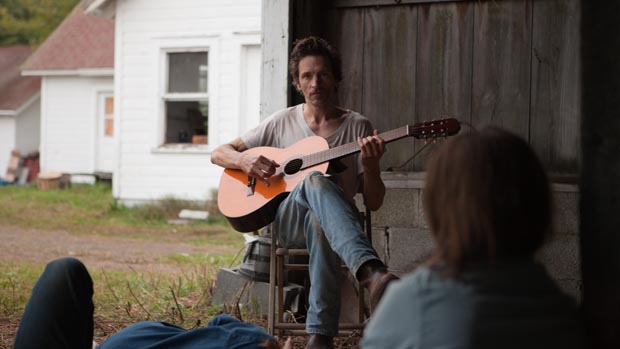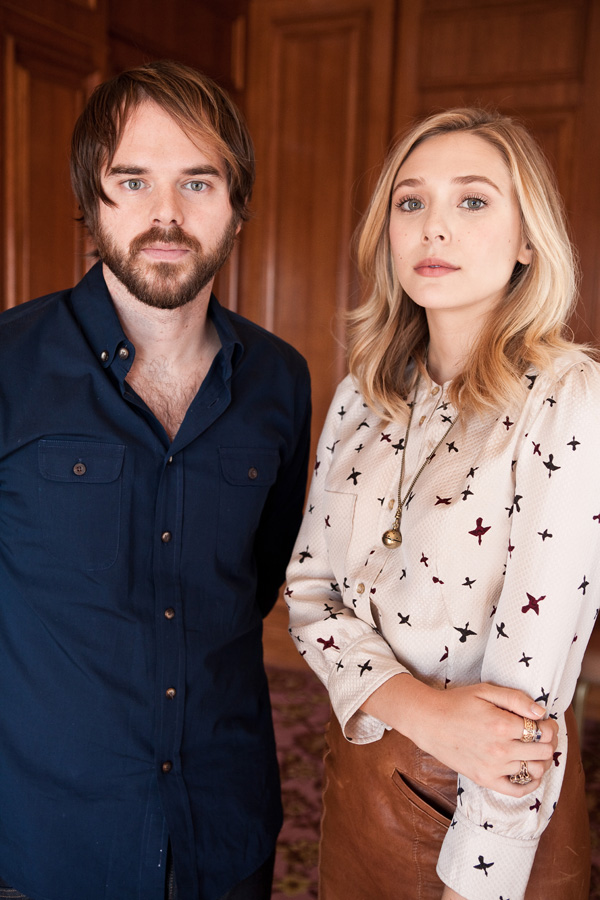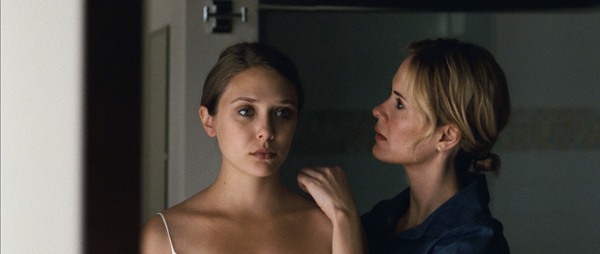 Back to selection
Back to selection
Trust Issues

A dark character study of a girl escaping a cult, Sean Durkin’s feature MARTHA MARCY MAY MARLENE is an impressive debut that also highlights the talents of this year’s Sundance breakout actress, Elizabeth Olsen.
Though Martha Marcy May Marlene is his debut as a feature writer-director, Sean Durkin is hardly a novice to the indie film world. Making his bones the last five years at his production company Borderline Films with partners Antonio Campos and Josh Mond, Durkin has produced Campos’s films (Afterschool and his upcoming Simon Killer), as well as executive produced Alistair Banks Griffin’s 2010 Cannes Un Certain Regard entry Two Gates of Sleep. But Borderline was initially built around the directorial ambitions of all three of its partners, and this year was Durkin’s time to step up.
The seed of Martha Marcy May Marlene lay in what Durkin says is his lifelong fascination with cults. The subject was a perfect match for Durkin and Borderline, which, over the years, has developed an astringent company aesthetic suggesting an American independent take on Michael Haneke’s violent psychological dramas. Durkin obsessively researched the topic off and on for years before writing a script that highlighted the ways cults manipulate their young recruits. After financing issues delayed his shoot, he decided to make a short exploring the same themes, Mary Last Seen. A prequel to his feature, the film is chilling in its matter-of-fact, almost clinical look at one young girl’s abduction. Shot quickly and for a tiny budget, Mary Last Seen won the Best Short at Cannes’ Directors’ Fortnight.

Shortly after Cannes, Durkin began production on Martha Marcy May Marlene and premiered it just a half year later in Sundance’s Dramatic Competition section. While the short focused on a girl entering a cult, the feature examines the mental and physiological toll on a girl who has left one. Durkin (who won Sundance’s Best Director prize) shows off his eye for talent by casting Elizabeth Olsen in the lead role. Though known in pop culture circles as the younger sister of Mary-Kate and Ashley Olsen, Elizabeth has stayed under the gossip-rag radar, studying acting at NYU before appearing in Durkin’s film as well as other upcoming titles, Silent House and Peace, Love and Misunderstanding. Her lead role in Martha heralds what will surely be a long career. Her performance as a young woman struggling, perhaps futilely, to adjust to normal life, is both tough and heartbreaking.
Before they traveled to the Toronto International Film Festival, Durkin and Olsen sat down with Filmmaker to discuss the film that’s made them both breakout stars. Fox Searchlight opens the film October 21.
Elizabeth, how did you hear about the project? Olsen: I auditioned right before filming Peace, Love and Misunderstanding. We had Mondays and Tuesdays off [for that film] so I was able to come down to the city to audition.
Durkin: [Laughs] “I’ll just come in on my day off!”
Olsen: I loved the script! I’d just started reading scripts in January and this was late summer [when I auditioned]. I didn’t get to read lots of challenging roles, especially as an unknown. Nobody wants to trust you with anything too challenging. It was really exciting to read something that was so great. I didn’t have any expectations of getting the part or not, but I really wanted it and I really thought I knew what Sean wanted. [Looking at Sean] I remember being surprised by how you looked. I remember that about the audition.
Durkin: [Laughs] You’ve never said that before. I don’t want to know what you expected.
Olsen: Older.
Durkin: Oh, okay.
Sean, what made Elizabeth right for the role? Durkin: In her first audition she made a couple of really subtle choices, and I didn’t know what she was doing but I knew it was something interesting. She was really deep in thought but in a way that was effortless. It didn’t really look like she was trying.
Elizabeth, going into the audition did you have a game plan of different emotions you had to show? Olsen: No. I love auditioning because it’s the time when you get to make your own choices. No one else has an opinion. I just made my own choices and figured out how I thought the character should be. I was also simultaneously moving out of my apartment so I just had to make sure I could focus once I dropped my bags.
Durkin: That was the other thing that struck me. After the audition I went outside in the waiting room and she had big suitcases and was getting ready to go. I’m expecting some dude to be waiting outside the hallway to help her, and no one was there. So I ask, “Is someone here to help you?” And she’s like, “No, I got it.” And she’s lugging this stuff around. It was just funny seeing that, and it struck me that she was a strong person. Seeing what she had done in the audition and then how she is in real life, getting a sense of her as a person, I just felt if you take that person who is strong and put it in this shell that’s Martha maybe we can get a glimpse of that strength — a kind of “what could have been” for Martha. But at the time it was hard to articulate that. [Looking at Olsen] I was surprised you didn’t have a guy there helping you out.
Olsen: No I didn’t [laughs].
Sean, were there ever discussions of getting more of a “name actress” to play the part? Durkin: No. Luckily we at Borderline have developed a system where we’ve never taken financing that would restrict casting choices or editing choices. We’ve had [those kind of] offers and turned them down. We’ve been lucky to find collaborators who have financed our films and been really respectful on those points. And I felt really strongly that it should be an unknown. I mean, very early on in the process you talk about [casting up], but at a certain point I wanted to discover somebody.
Did you two spend a lot of time talking about the character before shooting started? Durkin: No. We didn’t have any time. We had two auditions, and I think we had a phone call. In our brief conversations I just felt really confident in her. We had one meeting in New York the week before we started, and we only talked for like an hour. I have a philosophy that you cast someone because you believe in them, and then [after casting] I like to make myself as available to them as they want me to be. I felt we talked as much as we needed to. Everything is in the script — the script is very thorough, more so than the film, even.
Elizabeth, how did the character change for you after reading the script more and talking to Sean? Olsen: It became more full, but I never think of a backstory or things like that.
Did you do your own research into cults, or did you just rely on what was in the script? Olsen: At the Atlantic Theater Company, where I went to acting school, you’re taught to deal with the words on the page and not add your own BS to it. So it changed because it became more full and specific and detailed, and I think there were parts that I learned as we were going, but it was definitely what I imagined.
Sean, what did you take away from participating in the Sundance Labs? Durkin: I don’t think it was as much about learning and having these breakthroughs. I mean there were a few things, but it was mostly about process and going through it and experimenting. We shot scenes, we edited, and there were no consequences besides showing [them to] a room full of people who you’ve admired for at least the last decade [laughs]. Above anything you’re isolated, focusing on your work and not having to worry about day-to-day life. You can’t specifically put your finger on how it helps because it helps in every way possible.

When does your process begin with your d.p., Jody Lee Lipes? How early do you begin discussing the film with him? Durkin: Jody and I had been talking about the movie for a couple of years, but we hadn’t prepared anything. I mean, I went over to his house a year before we started shooting and gave him some movies. But it doesn’t really go anywhere until you’re like, “Okay, we’re shooting in four weeks.”
What movies did you give him? Durkin: Rosemary’s Baby and 3 Women, and he gave me Klute. I’d also never seen Interiors, and I really liked how Margot at the Wedding looked. So we watched all that stuff, and then we talked about what we liked, what we wanted to create, and then we made a few big decisions. Like, we’re going to have the same look throughout — there isn’t going to be a difference in look between the two areas. And we wanted it to be grainy. We always used the word “worn,” like “worn in,” like how the farm is worn in. Jody really hit the nail on the head, and we identified this watching Margot — the milkiness and the blacks. So it was taking that and then combining all these things that we liked. You’re influenced by things, but at the end you decide your own language.
Elizabeth, doing three films back to back, was there any point where you hit the wall? Olsen: After Silent House I was done for. I was home for two months and just hung out with friends and did lots of yoga. My body was wired differently too because in Silent House so much of it was high emotion — I became more sensitive as a person without meaning to. If someone said something normal to me, I could cry. My wiring was just different, and I hated that. I’m someone who’s able to bounce back quickly, so it was bizarre to me.
And in Martha Marcy May Marlene you are internal in your emotions while in Silent House you’re letting a lot out. Olsen: It was a marathon. However, I was exhausted shooting [Martha] too.
Durkin: You didn’t show it.
Olsen: I would nap a lot. Like when Jody would say, “45-minute set up,” I would say, “Yes!”
Durkin: Yeah, I guess she napped a lot [laughs]. We would have this joke about her napping where we’d just wake her up and she’d still be half asleep and we’d start shooting.
Olsen: But then you’d say, “Sleep on this couch for this scene,” and I’m like, “Great!”
Durkin: But you being tired never affected the energy of the movie. It was pretty impressive. I’ve had the fortune of working with older and more experienced actors in the shorts we’ve done and the films I’ve produced for Tony. I’ve worked with inexperienced actors too, and it’s amazing because when you cast an unknown actress who’s never been a lead, you’re worried you’ll have to work hard to pull a performance out of her. But what was so striking was that Lizzie showed up as prepared as Sarah [Paulson], Hugh [Dancy] or John [Hawkes]. Right from the get-go [Lizzie] was there, was in the ballpark. There were no games or extra work to pull anything out of her. It was insane.
Sean, what was different for you directing a film after having been a producer? When I’m producing a film I can hide a little bit if I need to hide. In directing you can’t hide, and [keeping] that concentration and focus is really difficult. But you just do it because you’re getting an opportunity to fulfill a lifelong dream. You just get this rush of adrenaline the whole time and it keeps you going.
Elizabeth, you’ve said in interviews that one of your biggest fears doing movies is the press you have to do. But you seem so comfortable doing it. What are the fears you have? Olsen: I think I saw the worst of it from being around my sisters. It’s not so much doing this — talking about the work. It’s the other BS that happens where everyone in the world thinks they are part of our personal life. What’s frightening is that you can lose privacy. In theater it’s different, so that’s why I took to studying theater. It wasn’t just acting, it was studying, and I felt safe and creative doing that.
You’ve now gone back to school? Olsen: Yes. It’s a three-year conservatory program so I’m done with the acting part. Left is just the academic part NYU requires you to do to get the full degree. I might graduate by 2012, but maybe not. I’m not giving myself a deadline [laughs]. I actually didn’t even want to start working until I got out of college [laughs]. But I just feel like I’ve been at the right place at the right time for about a year now, and I feel lucky.
